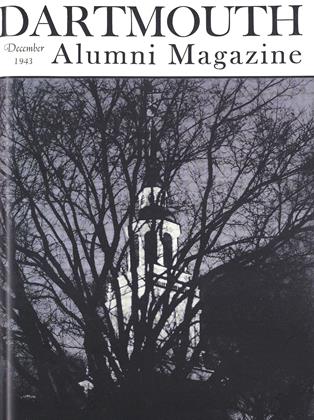ALTHOUGH DURING THE WARTIME STRINGENCY nothing can well be done beyond making tentative plans for it, the proposal of James W. Newton '86 that a dignified memorial to Eleazar Wheelock, founder and first president of Dartmouth College, be erected at some suitable spot in Hanover is being earnestly considered by a special committee named in response to a vote of the Alumni Council. The project, obviously worthy in itself, seems to have gained added impetus through the feeling that something should be done to emphasize the nobility of Wheelock's achievement as a counterbalance to the lightsome stress laid on half-legendary, or wholly mythical, concomitants of the first president's gigantic task by poets and mural artists. Too much, say many critics, has been made of the "primitive alcazar" and too little of the indomitable courage of the Connecticut missionary who went into the wilderness to teach the Indian.
There is a good deal of solid sense in that, even though one may do well to remember that the murals in the basement of Thayer Hall merely illustrate Richard Hovey's rollicking song and as such no more merit condemnation than does the song itself. There is certainly abundant need for a serious recognition of Wheelock's stupendous achievement as an offset to this tendency to lay emphasis only on the lighter side. After all, the founding of Dartmouth was a serious undertaking, and not a gay adventure. There is room for both views, but it is certain that a misconception is promoted when stress is laid on one alone.
Therefore it is welcome that at long last some special memorial be considered to the man who, in the face of obstacles that would have discouraged any ordinary man, founded our college and who builded better than he knew or could have dreamed. It is not enough to dismiss Wheelock with a paraphrase of Sir Christopher Wren's famous epitaph—"lf you seek his monument, look about you." The Dartmouth that now is must be regarded as the monument of many who have participated in making it, not only of Wheelock who founded it, but of Webster who saved it from extinction, and of such wise leaders as Tucker and Hopkins who developed it. Something surely should be done to signalize the deeds of the great man whose fortitude sufficed to plant the seed from which this tree has something seriously worthy of what that man did.
HOMAGE PAID TO OLD GLORY BEFORE A FOOTBALL GAME ON MEMORIAL FIELD
 View Full Issue
View Full Issue
More From This Issue
-
 Article
ArticleV-12 PHYSICAL TRAINING
December 1943 By C. E. W. -
 Article
ArticleA REPORT ON FINANCES
December 1943 -
 Class Notes
Class Notes1937
December 1943 By JOHN H. DEVLIN JR., FRANCIS T. FENN JR. -
 Article
ArticleEMPLOYMENT FOR ALUMNI
December 1943 By PROF. FRANCIS J. NEEF -
 Class Notes
Class Notes1933
December 1943 By GEORGE F. THERIAULT, LEE W. ECKELS -
 Article
ArticleSHATTUCK OBSERVATORY
December 1943 By L. B. RICHARDSON '00












